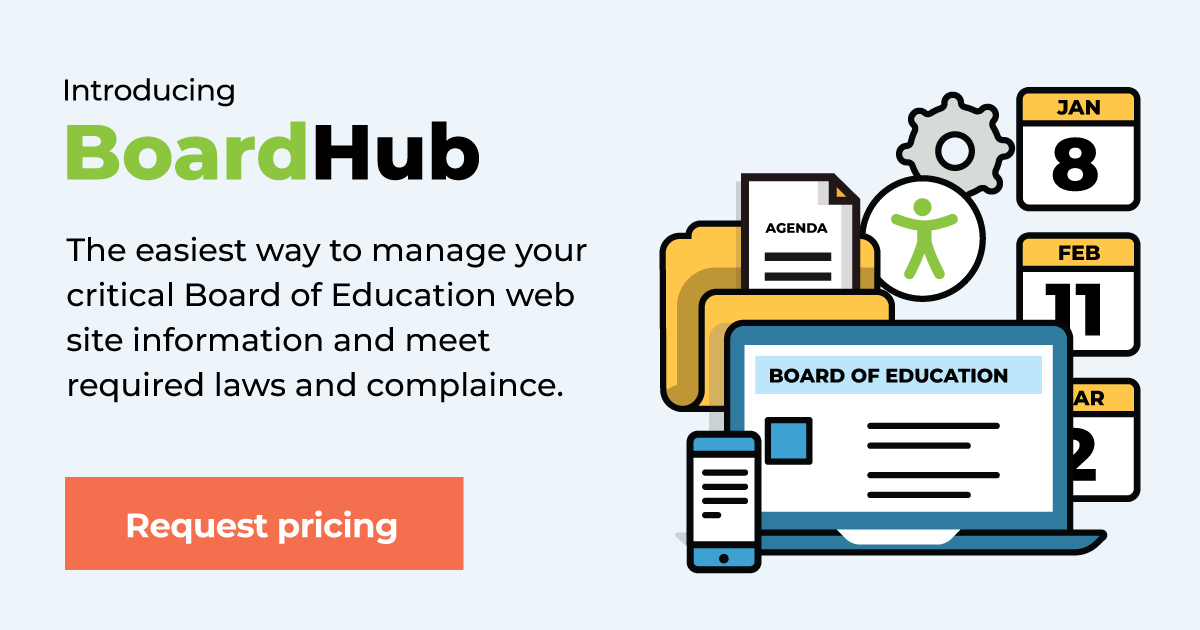Open Meetings Act, Public Records Law, Freedom of Information. They’re known by different names depending on the state where your school district operates. Commonly referred to as Sunshine Laws, these are the legal obligations that maintain transparency for public bodies – including school boards.
Your school district may be skirting the letter of the law(s) that apply to posting critical state-mandated information. Each and every district is responsible for publishing core school board information that is vital to this notion of openness and transparency.
This article outlines four safeguards to avoid school board website violations that pertain to open meeting violations.
Learn about BoardHub™ for managing school board information to meet requirements for Open Meeting Act and ADA compliance.
School board accountability
Each state has its own specific requirements for achieving transparency for its school boards, and every district is responsible for accurate and timely accounting of some pretty basic information. For the most part, they all specify the following:
- Providing advance notice of the meetings
- Posting the agenda
- Recording the minutes
- Archiving all this content
There are timetables and deadlines that accompany these requirements in order to satisfy state reporting obligations. Not complying with these simple conditions, however, creates potential liabilities for any school district.
1. Educate your board
Cases abound of schools either rightfully or wrongfully accused of violating open meetings laws.
Redistricting and consolidation, for example, are issues many districts are grappling with as enrollments shift and financial support grows more tenuous. Overcrowding and advancing socio-economic equity are requiring school boards to make some hard and often unpopular decisions. But decisions that must remain quite public and must not be held behind closed doors.
Besides ill-advised and quite illegal closed-door deliberations, text messaging – the easiest method for many of us to collaborate – also presents some red flags for board members who may be unwittingly placing their districts in jeopardy. A Michigan school district learned this lesson the hard way when a de facto quorum – in this case seven members of the school board – occurred during text communications surrounding teacher pay raises.
Ironic that a board of education needs education, but they do when you consider the liabilities involved. It’s the district’s responsibility to get every board member (and key school administrators) up to speed with applicable state laws governing the dos and don’ts of being on a board.
Refer to your state board of education for resources to help your school board members, and make certain the communications lead in your district is aware of state reporting guidelines.
2. Keep it open, keep it on your website
While each state has its own specific laws regarding school board ethics, total transparency is the legal common denominator from coast to coast.
Your district website, your communications hub, is your best hedge against violating transparency laws. It’s your most visible, accessible, 24/7 collection of all your key school communications. So it makes perfect sense that you utilize a well-equipped website to publish your critical school board information.
Make sure your district site has not only the board basics: member listing, mission/strategic plan, calendar, but also has the official documented business of the board. Some districts even post links to videos and/or audio recordings of their board business meetings.
With all due respect to the athletics schedule and lunch menu, of all the information published on your district website, school board information is hands-down the most important.
3. ‘Paperless’ assures transparency and accountability
Many school districts are shifting to a “paperless” system for managing their board meeting information. In addition to board member profiles and policy documentation, meeting schedules, agendas, minutes, packets and attachments are published digitally.
With a paperless approach, districts are assured of keeping their board content current. Districts can also use a centralized board hub as a way to reference the open-meeting laws by which they must abide in their respective states, and remind the public that they are toeing the line when it comes to transparency.
Some school website content management systems make it easier than others to be paperless. SchoolNow has recently introduced a dedicated feature, BoardHub™, to help districts streamline board information publishing.
4. Keep board info ADA-compliant
The fourth consideration to safeguard your school board against challenges to accessing critical, state-mandated information is ADA compliance. Just as your entire school website needs to be fully accessible to people with disabilities, it only follows that your web-based board information also must comply with U.S. federal accessibility laws.
A majority of board content is posted via PDFs. These too need to be ADA compliant and fully accessible. There are easy ways to manage all PDFs on your school website.
Many school districts got the wake-up call years ago when they were forced to respond to Office for Civil Rights complaints being levied from disabilities advocates. In fact, the Website Accessibility Center was established to forearm schools and educate school administrators on how to go about eliminating barriers to content on their school websites.
But ADA accessibility laws apply to ALL your web content, including all the PDFs that reside on or are linked to your website. While some board content (e.g., mission, board member photos) may reside on web pages that in fact are ADA compliant, a majority of board content is posted via PDFs. These too need to be ADA compliant and fully accessible.
For a good overview that puts ADA-compliance in perspective, read Steve Williams’ article, WCAG 2.1 and What it Means for School Website ADA Compliance.
Conclusion
If your district has a school board, you are bound by the open meetings laws. So make certain you exercise the safeguards outlined above to assure you stay on the right side of your state law governing public access to board information.
Make sure you educate your board members and key school administrators about their responsibilities, precautions, and limitations surrounding open meeting compliance. Use your school website as a central hub for all applicable school board information. And help your school board be fully accountable and transparent by using the right tools. Finally, make sure all your board documents are fully ADA-compliant, for it’s one thing to have a website that’s ADA-compliant, but what about your board meeting info?
Topics: Website accessibility Content management
About the author
Marketing director and content strategist for SchoolNow, Jay’s a former school public relations specialist who’s helped businesses, schools and colleges use the power of communications to improve their image, generate support, and optimize relationships. Reach him at jay@schoolnow.com.
.png?width=64&height=63&name=Group%20(4).png)
.png?width=66&height=64&name=Group%20(5).png)
.png?width=56&height=60&name=Group%20(6).png)
.png?width=66&height=52&name=Group%20(7).png)
.png?width=56&height=56&name=Group%20(9).png)
.png?width=59&height=52&name=Group%20(10).png)


